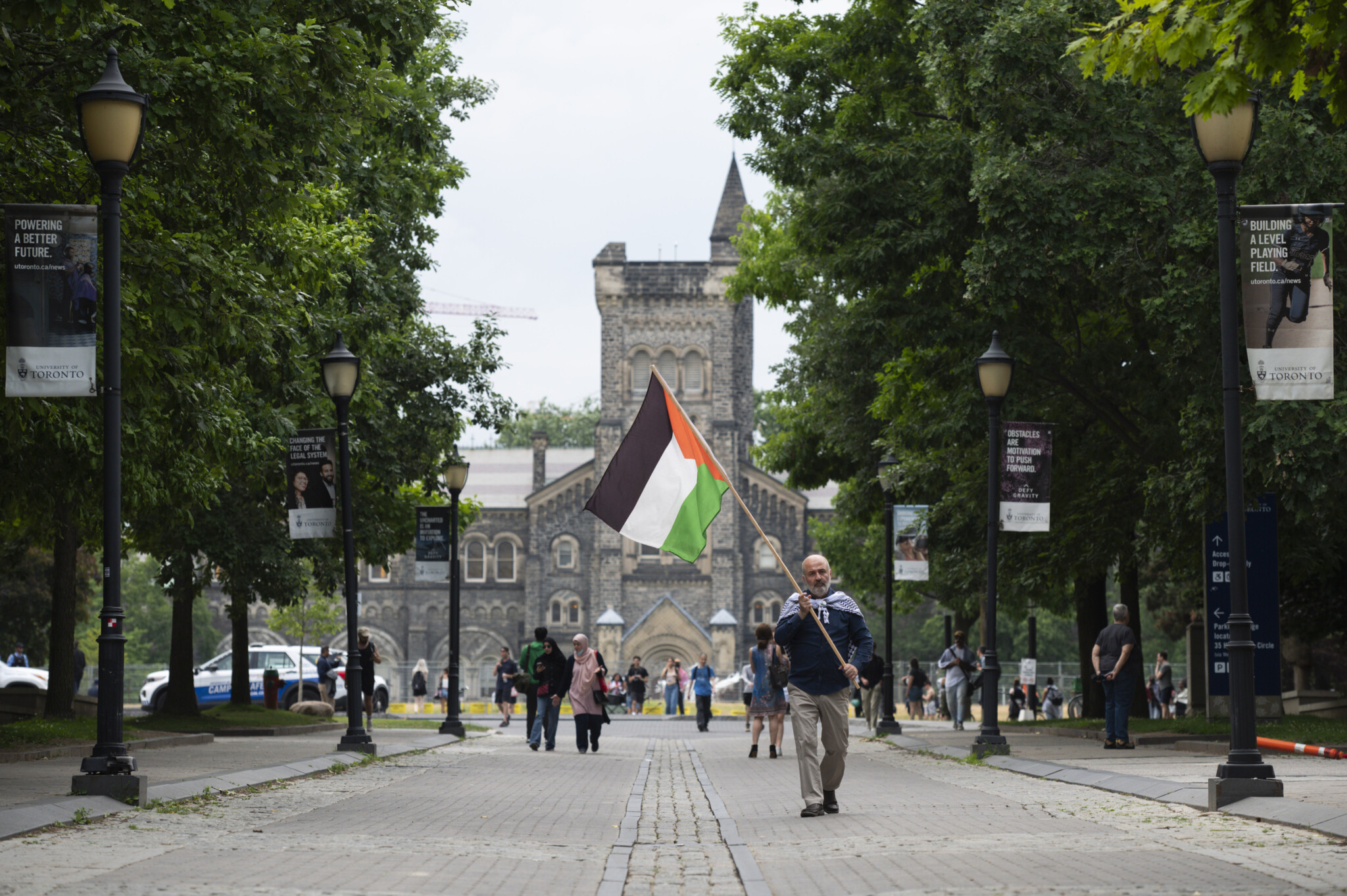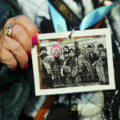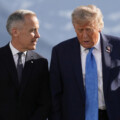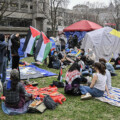A new report from the Institute for the Study of Global Antisemitism and Policy (ISGAP) accuses Canadian universities of becoming hotbeds for anti-Israel and antisemitic activism, fueled by foreign state actors like Qatar.
“[T]he report not only describes the historical context that allowed such radical ideologies and actions to manifest across campuses, but also provides an in-depth analysis of the organizations—both on and off campus—that enabled and supported them,” asserts ISGAP.
The findings from the non-partisan antisemitism research organization that counts Irwin Cotler, former Canadian minister of justice and former Canadian special envoy on combating antisemitism, as an advisor, offer insight into how this radicalization has reportedly taken root—and raises urgent questions about the alleged complacency of universities to root out this bigotry.
When asked about whether they monitored potential foreign funding to their student groups and clubs, universities interviewed by The Hub either said they didn’t track it or ignored the question entirely. This raises significant questions about the oversight of these student bodies, given that they can receive access to school office space and resources.
Funding from Qatar
According to the report’s authors, behind this rise in radicalism lies a troubling pattern of foreign influence met by governmental inaction. Canadian charities with reportedly known ties to foreign terrorist groups—including Hamas—have allegedly funnelled funds into Canadian Islamic centres and organizations.
These donations have not been made in isolation, according to ISGAP. Instead, they are allegedly part of a deliberate, multi-pronged strategy aimed at influencing Canadian civil society, including academia.
Sandwiched between Saudi Arabia and Iran, Qatar’s geopolitical alignment is difficult to pin down. In the past year, it has sought closer ties to the West by gifting a plane to U.S. President Donald Trump, yet has also been accused of aiding and abetting terrorist groups in the Middle East. Qatar has long hosted Hamas leaders and is alleged to be one of the group’s largest financial backers. While Qatar has hosted peace negotiations between Israel and Hamas, and more recently joined calls for Hamas to demilitarize, its record remains marked by deep ties to the group.
Qatar’s funding strategy is reportedly multifaceted. Through state-owned entities such as Qatar Charity and Eid Charity, ISGAP says the country has provided substantial funding to organizations with direct access to Canadian youth networks.
For example, in an investigation mentioned in the report, the Canada Revenue Agency (CRA) found that the Muslim Association of Canada (MAC), which has programs that specialize in educational outreach, allegedly accepted funds from Qatar Charity. The charity has alleged ties to terrorist groups and allegedly financed Osama bin Laden’s Al Qaeda in the 1990s. Additionally, the Qatar Charity is considered to be part of the U.S. Treasury-identified Hamas fundraising network called the “Union of Good.” The Qatar Charity was banned in Israel in 2008 for its membership in the Union of Good, which Israel also identified as a Hamas fundraising network.
The CRA stipulated that while they “did not find any evidence to suggest that the organization [MAC] was being directly influenced by its foreign donors, the fact that such foreign donors are known to promote extremist ideology or association with terrorist groups is a concern.”
In response, MAC stated the CRA audit was “based on systemic bias,” citing two independent reports from the University of Toronto’s Institute of Islamic Studies and the International Civil Liberties Monitoring Group that found CRA “has implicit systemic biases and practices” and “unfairly targeted Muslim charities with prejudiced audits.” MAC contended that the CRA interpreted “normal interactions as deceptive,” applying “standards that would never have been applied to non-Muslim charities.” They added that they relied on “old newspaper articles, blogs, and other unreliable sources that contain Islamophobic writings.”
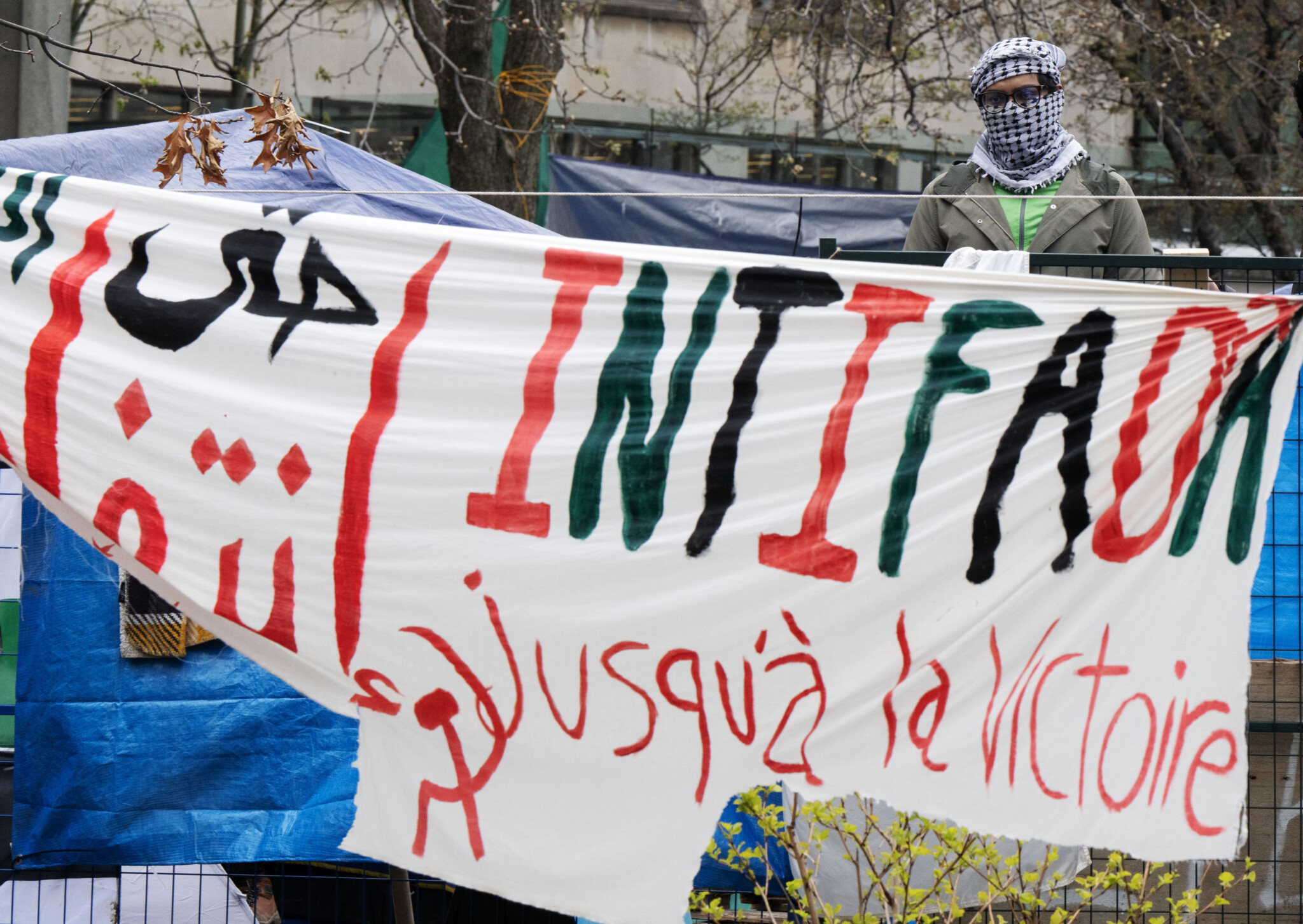
A pro-Palestinian activist looks out from behind the fence at their encampment on the McGill University campus, in Montreal, Wednesday, May 1, 2024. Ryan Remiorz/The Canadian Press.
Foreign governments, terrorist groups, and the financing of student protests
The ISGAP report alleges that Qatari, Chinese, and terrorist-linked backing are playing a significant role in sustaining student protests on Canadian campuses, challenging their portrayal as grassroots movements.
It singles out the Vancouver-based Samidoun for playing a prominent role in student protests. Samidoun is a listed terrorist entity in Canada tied to the Popular Front for the Liberation of Palestine (PFLP)—a group linked to plane hijackings, suicide bombings, and the October 7 attacks.
The University of Toronto encampment was cited by ISGAP as a case study. Drawing on research from the Network Contagion Research Institute (NCRI), the ISGAP report alleges that there is a link between the “Shut It Down for Palestine” (SID4P) coalition and Chinese Communist Party influence through activist Neville Roy Singham and his wife, Jodie Evans.
CBC News interviews indicated that University of Toronto students were not financing the encampment entirely by themselves, and that some supplies were provided to them by “community members” and supporters from outside of the university community.
ISGAP says chapters of the Muslim Student Association (MSA) have “actively disseminated Muslim Brotherhood ideology on Canadian campuses since the 1960s.” The University of Toronto chapter specifically supported the encampment protests across Canada that occurred in the summer of 2024.
“[E]very office of the MSA is a Muslim Brotherhood office in Canada,” claimed Tarek Fatah, the founder of the Muslim Canadian Congress, in testimony before the House of Commons Standing Committee on Foreign Affairs and International Development in 2015.
The ISGAP report claims that the influence extends further through scholarships and exchanges with Qatari institutions. This foreign financial backing has also allegedly enabled the dissemination of activist literature and the organization of speaking events that feature individuals with alleged records of antisemitic or pro-terrorist statements.
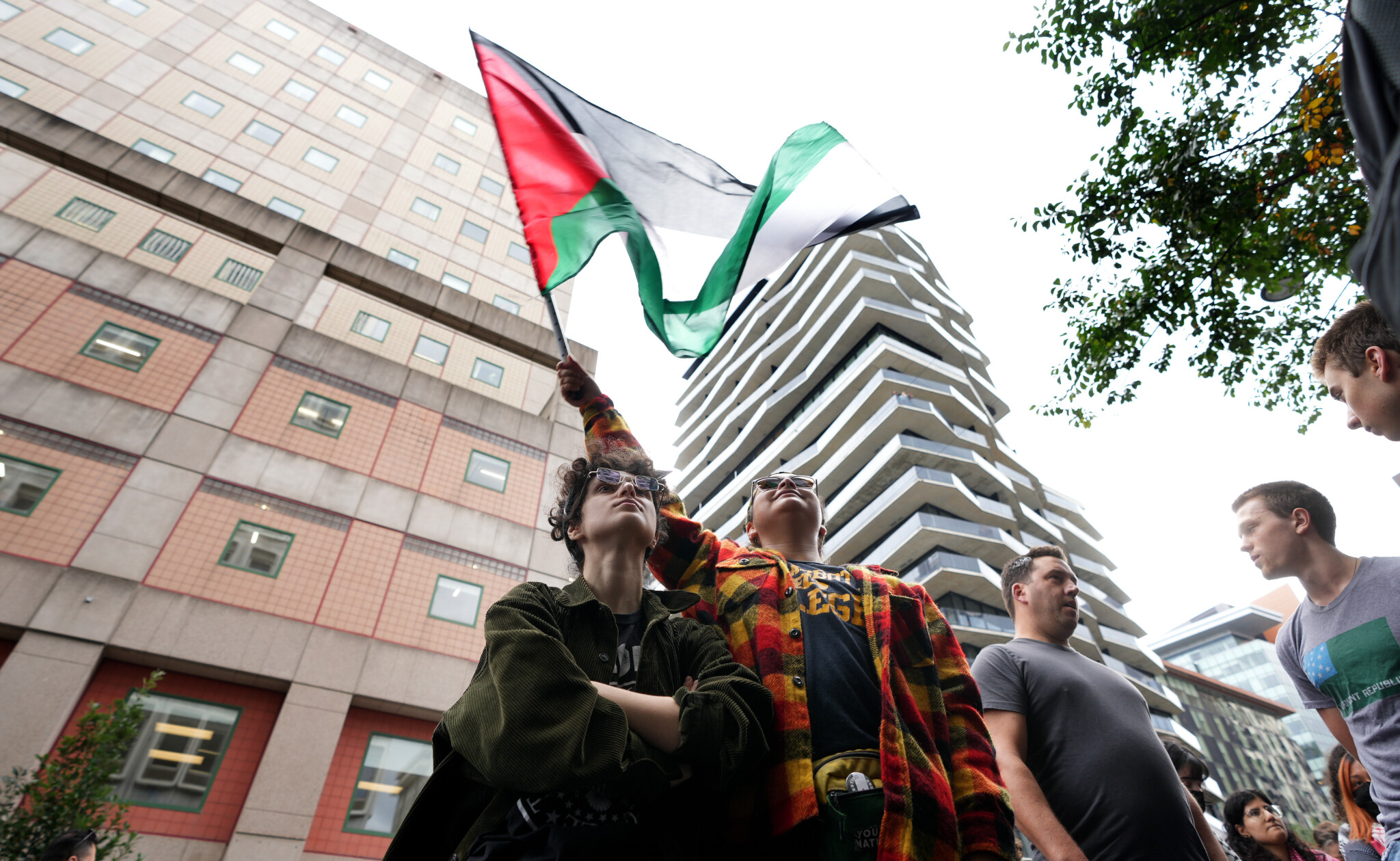
Attendees wave a Palestinian flag during a pro-Palestinian demonstration on the anniversary of a Hamas attack on Israel that triggered the ongoing war in Gaza in front of Concordia University, in Montreal, Monday, Oct. 7, 2024. Christinne Muschi/The Canadian Press.
Federal funding
Federal funding has flowed to organizations with documented ties to extremist groups, insists ISGAP. The Muslim Association of Canada (MAC), for example, received over $6 million in government funding in 2023 alone, according to charity watchdog Charity Intelligence Canada, despite being the subject of a 2021 CRA audit that found evidence of support from the Muslim Brotherhood and IRFAN Canada, which Canada designated as a terrorist entity because of its support for Hamas.
Meanwhile, according to the Middle East Forum, Islamic Relief Canada (IRC), another major recipient of federal funds, allegedly funnelled money to its parent organization, Islamic Relief Worldwide (IRW), a U.K.-based organization that has been banned in Israel due to ties with Hamas. According to the Government of Canada, the IRC received more than $2 million in Canadian government funding in both 2022 and 2023.
ISGAP, the group behind the report, has faced its own funding criticism. They have allegedly previously received substantial funding from the Israeli government and have allegedly acted in coordination with an Israeli ministry, according to reporting. Their critics say ISGAP’s reporting on university-based antisemitism in Canada may reflect not just independent research but also diplomatic and political priorities.
The reality on campus, and what universities say they’re doing about it
ISGAP’s report also condemns the actions of universities themselves for creating a learning environment where Jewish students report being targeted for expressing sympathy for Israel and being excluded from social and academic spaces. These feelings heightened around the encampments, which occupied university lawns for months. ISGAP says these environments were tolerated, and in some cases, promoted by faculty and administrators.
In response to The Hub’s inquiries, four universities mentioned in the report—Concordia, the University of Toronto, McGill University, and York University—provided written statements outlining their reaction to the findings and detailing their efforts to combat antisemitism. Each emphasized their values, listed measures taken since October 7, and reaffirmed their formal commitment to inclusion.
Concordia University stated that it had increased monitoring of events and demonstrations, deployed additional campus safety personnel, as well as taken disciplinary actions against groups that violated the university’s Code of Rights and Responsibilities. Workshops on antisemitism, the STRIVE (Standing Together against Racism and Identity-based Violence) Task Force on campus climate, and the “Courageous Conversations” speaker series were listed as efforts to “encourage dialogue and solidarity across communities.”
Despite these steps, the ISGAP report claims Concordia is a “flashpoint for anti-Israel activity,” with Jewish students reporting exclusion, harassment, and an absence of institutional support.
The University of Toronto also detailed extensive measures, declaring that it “condemns antisemitism and takes strong steps to combat this pernicious form of hate.” These steps include the creation of a new position—assistant director, faith & anti-racism—in their Institutional Equity Office, the publication of “Addressing Antisemitism at the University of Toronto,” a substantive guide for handling antisemitism at the university for faculty and administrators, and the launch of a Faith & Anti-Racism Inclusion Strategy. A user guide on protest policy was also issued to clarify the bounds of lawful assembly.
The University of Toronto went on to emphasize the autonomy of student organizations and explain that “The university does not, in the normal course of events, monitor or review their activities.”
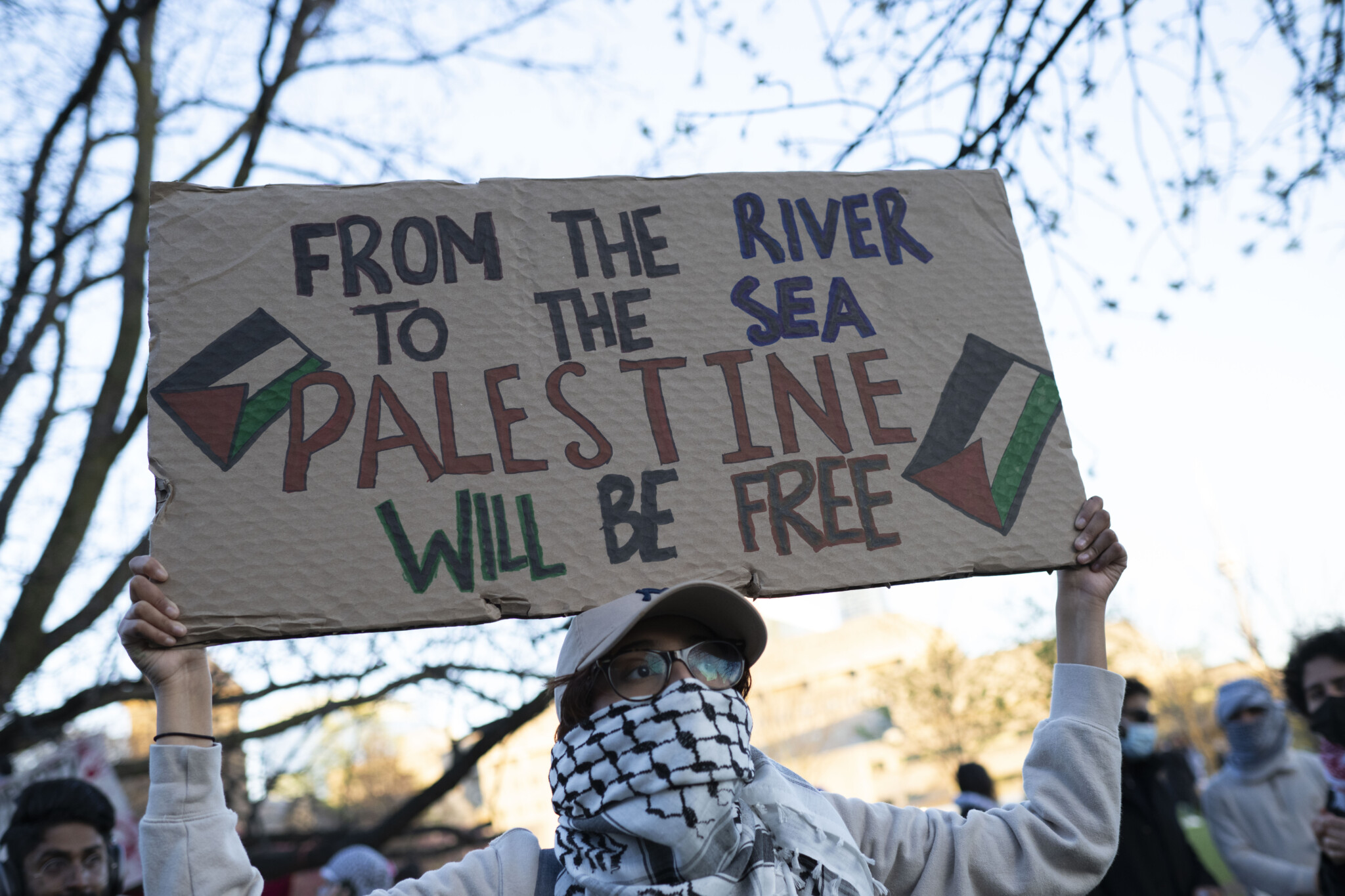
Protesters gather in an encampment set up on the University of Toronto campus in Toronto on Thursday, May 2, 2024. Christopher Katsarov/The Canadian Press.
McGill University offered a categorical condemnation of antisemitism on campus.
“McGill unequivocally denounces all forms of antisemitism and anti-Jewish hatred,” it stated. “Acts of vandalism, intimidation, or obstruction have no place at McGill or in society.” The university noted recent steps to enhance security and reaffirmed its “duty to protect the academic freedom of its scholarly community…from infringement and undue external influence.”
McGill is also prominently featured in the ISGAP report, which documents how anti-Israel protests occupied academic buildings and how administrators were slow to intervene.
Toronto’s York University claimed the ISGAP report’s references are “for the most part outdated.”
York stated that it is “currently reviewing the report to determine if there are any opportunities to strengthen the actions that we have already taken.” They cited the creation of the president’s Initiative on Open and Respectful Dialogue, their Equity, Diversity, and Inclusion Strategy 2023-2028, as well as their role as the first Canadian university to participate in the Hillel International Campus Climate Initiative. The initiative included training for administrators and a thorough review of Jewish student experiences on campus.
To address safety concerns, York stated that its community safety team had increased patrols, CCTV monitoring, and police coordination since October 7. An “Incident Response Plan” was created, along with support services such as security escorts and concealed classroom locations, to prevent incidents of antisemitism or disruptions.
None of the universities’ statements mentioned Qatar, China, or any other foreign actor by name. None of the universities told The Hub that they monitor foreign funding to student groups and clubs when asked. The statements reflected a common thread: universities are aware there’s a crisis, have invested in a slew of initiatives to try and address it, but continue to insist they have a principled commitment to safety and inclusion.
However, for Jewish students, the question remains whether these measures adequately address the scale of the problem and whether institutions can reconcile their stated ideals with their operational realities.
Reclaiming the civic mission
Canadian universities have historically played a critical role in shaping Canada’s values. But today, as ISGAP reports, they risk becoming incubators of intolerance unless meaningful action is taken. That action must begin with transparency: audits of foreign funding, stronger plans to combat antisemitism by all levels of government, and the imposition of academic standards that do not permit hate to masquerade as scholarship.
